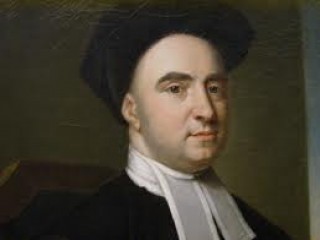
George Berkeley biography
Date of birth : 1685-03-03
Date of death : 1753-01-14
Birthplace : County Kilkenny, Ireland
Nationality : Irish
Category : Historian personalities
Last modified : 2011-05-24
Credited as : Thinker, Anglican bishop,
The Anglo-Irish thinker and Anglican bishop George Berkeley developed a unique type of idealism based on an empirically oriented attack on abstract philosophizing combined with a defense of immaterialism.
Although born on March 3, 1685, at Dysert Castle in County Kilkenny, Ireland, George Berkeley considered himself to be English. He entered the county school at the age of 11 and in 1700 went to Trinity College, Dublin. He earned a bachelor of arts degree in 1704 and a master of arts degree in 1707, the year in which he became a fellow. Berkeley maintained his appointment until 1724, when he became dean of Derry, but taught at Dublin only until 1712. During this time he formed a club to discuss the "new philosophy" and wrote his most important works: Essay towards a New Theory of Vision (1709); Treatise Concerning the Principles of Human Knowledge, pt. 1 (1710); and Three Dialogues between Hylas and Philonous (1713).
Berkeley traveled to England in 1713. He was an intellectual and social success in London; he met the essayists Joseph Addison and Richard Steele and later contributed articles to the Guardian. The poet Alexander Pope described the young philosopher as possessed of "every virtue under heaven." Most of Berkeley's introductions to English literati were arranged by his older Dublin colleague and fellow clergyman, the satirist Jonathan Swift. The most important of these contacts was Lord Peterborough, whom Berkeley accompanied to Europe as chaplain in 1714-1715. During this journey he may have met the French philosopher Nicholas Malebranche. Between 1716 and 1720 Berkeley resided mainly in Italy and France, and while traveling he lost the manuscript of the second part of Principles of Human Knowledge, which was never rewritten.
In 1721 he published a short treatise on natural philosophy, De motu. and an anonymous book on social reformation, Essay towards Preventing the Ruin of Great Britain. About this time Berkeley conceived the idea of establishing a college in the Bermudas to reform the manners of the English colonists and introduce the gospel to the "American savages." Through the influence of his friends he received the necessary patents from Parliament and promises of financial assistance. In September 1728 he married Anne Foster, and shortly thereafter he sailed for the New World. From January 1729 until the fall of 1731 he lived in Newport, R. I. During this period he wrote Alciphron, a series of dialogues directed against freethinkers. The financing of the Bermuda scheme eventually failed and, after donating his books and property to Yale College, he returned with his family to London.
In 1734 Berkeley returned to Ireland as bishop of Cloyne, and he remained there for the next 18 years. Distressed at the widespread famine and disease in Ireland, he devoted himself to social and medical studies. In 1744 he created a considerable stir by publishing Siris, a work that extolled the virtues of tar-water as a cure for virtually all bodily ills and presented his final metaphysical and religious ideas. On the occasion of fighting between Catholics and Protestants, he wrote several liberal tracts promoting tolerance and humanity. Berkeley retired to Oxford University in 1752 and died suddenly on Jan. 14, 1753.
















